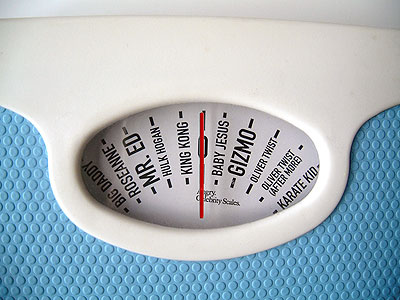I will acknowledge that weight loss is an important, emotional challenge for many – if not most – Americans. However, I believe it is used as an artificial yardstick to measure one’s health. One’s weight mightindicate obesity, but as a metric it is not conclusive. Sure, if you are 4’11”and 300 pounds, the scale is the frowning mother nudging you to watch your weight. But the scale does not know if you are a grotesquely overdeveloped 4’11” Olympic weight lifter, and that instead of fat, your body is fortified with muscles.
 |
| A scale with perspective |
If you’re starving yourself, you will notice signs of irritability, light-headedness, more hunger, and fatigue. Starving your body to look good, or lose weight, is like running your car on fumes just to go faster. It is illogical and bad for performance. Choosing to be thin –instead of healthy - may lead you to starve yourself of fuel and nutrients. This leads to worse health and fatigue.
And while training for a marathon, it is more important than ever to ensure your body has access to all the energy and nutrients it needs. And I am sure there will be fierce, if not misguided, temptation to cut back on the carbohydrates in order to lose weight.Don’t.
The only non-surgical way to lose body fat is to burn more calories than you eat. Period. Carbs aren’t fattening (unless you don’t burn them) and they are vital to top athletic performance. And only carbs can replace glycogen stores, not protein or fat.
Running regularly enables your muscles to burn fat for hours after exercise (and during too, of course). After 30 minutes of running, the body burns fatas an energy source. Forty minutes or longer will increase fatburning.
Look, the solution to losing weight is no big secret: eat right and exercise regularly. I like a plate of lard and stick of chocolate covered butter as much as the next guy, but the fat I invite into my body is not going to just will itself away. I have to exercise it off.
Humans, like most all mammals, were not meant to remain motionless, unless you believe gelatinous thighs, shirt-stretching spare tires, and pants-splitting dumpers were the image in which Heaven created humans.
Fat is like debt: unless its kept under control, it piles up in mammoth proportions. Eventually, the creditors – your heart and other organs – come calling to repo that which you’ve borrowed from them: money and life. Fat and poor health does not enjoy bankruptcy or debt protection. There is no temporary reprieve that excuses you from years of bad health. Rather, debt reduction and good fitness requires a strategy of austerity and discipline. Both are hard and seemingly impossible. Often, like buying things we don’t need and thereby running up debt, we snack and munch our spare tires into inner tubes.
To lose weight and keep it off, you must eat right. Don’t go on a diet you don’t plan to maintain for the rest of your life. Otherwise, you’ll be stuck in a diet cycle for the rest of your life. A good plan for weight loss is a good diet and exercise. But if there is any confusion about nutrition, exercise, and weight control, seek advice from a sports nutritionist at www.eatright.org and the National Center for Nutrition and Dietetics.
No comments:
Post a Comment